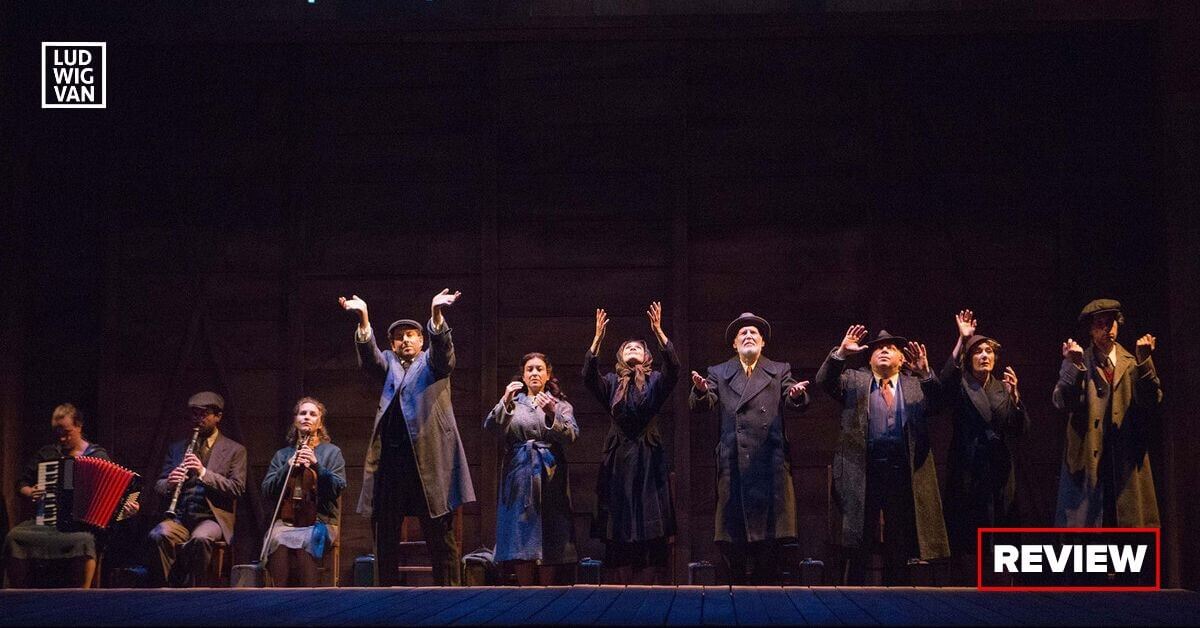
Off-Mirvish & Studio 180/Indecent, by Paula Vogel, directed by Joel Greenberg, CAA Theatre, Oct. 14 to Nov. 6. Tickets here.
Joel Greenberg’s Studio 180 has come up with another hard-hitting play, and you could hear a pin drop in the theatre as the respectful audience took in the production. Witnessing a troubled history can be an intense experience.
Indecent (2015), by acclaimed American playwright Paula Vogel, is a play within a play, and is anchored in real life. As the subtitle for Indecent states, “The true story of a little Jewish play”.
On one hand, we follow Sholem Asch (Jonathan Gould) as he writes his play God of Vengeance at the age of just 21. Polish-born Asch (1880-1957), was a prolific novelist, short story writer, dramatist and essayist, who is regarded as one of the greatest Yiddish writers of all time within the Jewish literary canon.
We not only learn about the contentious history of Asch’s play; Vogel also provides us with scenes from God of Vengeance itself.
The controversy surrounding God of Vengeance is that it shows the lead character in a bad light. Yekel (Nicholas Rice) is a Jewish brothel owner who attempts to become respectable by commissioning a Torah scroll and contracting a marriage between his virginal daughter (Jessica Greenberg) and a yeshiva student. His plans are foiled when his daughter falls in love with one of the Jewish prostitutes (Tracy Michailidis). For Asch, this lesbian relationship is a beautiful love story.
Also key to what unfolds is Lemml, the stage manager for God of Vengeance (Matt Baram), who is an early champion of the play, with Sarah Orenstein and Dov Mickelson performing several different roles (as do the other cast members).
Indecent is regarded as Vogel’s first play with music, and Laetitia Francoz-Lévesque (violin), Emilyn Stam (accordion) and John David Williams (clarinet) are skilfully woven into the production by Greenberg.
From the very first reading of God of Vengeance at a salon evening in Warsaw in 1906, where Asch’s mentor, the famous writer I.L. Peretz tells him to “Burn it, Asch, burn it!”, to its 1923 Broadway run that is shut down by the morality squad with the cast and producer arrested on obscenity charges, it is Jewish resistance to the play that is at the heart of the matter, and this despite the fact that Asch made key changes in God of Vengeance to render it more palatable to American audiences.
In fact, it was a certain Rabbi Joseph Silberman who denounced God of Vengeance in New York, and told one of the Yiddish newspapers, “This play libels the Jewish religion. Even the greatest antisemite could not have written such a thing.”
This is a troubling issue, among many that Vogel raises. With antisemitism rampant throughout society — and let’s face it, no matter what the era, it is always there — does showing Jews in a bad light feed into this prejudice, and contribute to existing negative stereotypes? Clearly, that is what both Peretz and Silberman thought.

I’d like to digress for a minute. Many, many years ago, Toronto Workshop Productions (where Buddies is now), mounted a play about a kapo. Kapos were Jews who were put in charge of fellow Jews by the SS in the Nazi concentration camps.
It was how these kapos elected to survive, even if it meant choosing fellow prisoners for back-breaking work details, or worse, selecting those who would go to the gas chambers. I still remember that searing play to this day, but so vitriolic were outcries from the Jewish community, that TWP shut down the production.
So, whether it is a play about a Jewish brothel owner and a lesbian relationship, or a Jewish kapo, has antisemitism, a plague that Jews have had to endure for centuries, made it impossible to show a darker side of the Jewish experience?
Asch himself explained in a letter to the New York court, that he only wanted to write, “an artistic play and a true one….there are good and bad in every race.”
Nonetheless, because Asch had to make changes for Broadway, which Vogel details in Indecent, art and creativity were compromised.
There is a further troubling takeaway from God of Vengeance. The play was a wild success in Europe, being translated into a dozen different languages, where it played in countries where there were both many Jews (Poland) and few Jews (Norway).
Nowhere, it would seem, was God of Vengeance accused of making the Jews look bad. Apparently, the play was accepted, as Asch had hoped, as a universal theme.
Yet, it is in New York where God of Vengeance encountered its most resistance. I look at our neighbours to the south today, and the swing to the religious right, and the ban on abortions and the rise of antisemitism to its greatest height in years, (the latter in Canada as well), and I wonder how would God of Vengeance fare on Broadway today? Would some Jewish groups worry about the play feeding into antisemitism and enhancing already prurient stereotypes?
While Indecent’s main stream is following the journey that is taken by God of Vengeance from Warsaw to New York, Vogel has also included fascinating scenes from Asch’s life, and so presents us with a complicated, sensitive and fragile man whose early courage became blunted over time.
As for this production of Indecent, the acting is strong, Greenberg’s direction is adroit, and Ken Mackenzie’s set, Kimberly Purtell’s lighting, and Michelle Tracey’s costumes are evocative, with the entire experience made all the more poignant by the haunting klezmer music score from Lisa Gutkin and Aaron Halva.
Nonetheless, my apologies to the cast and creative team for making such short shrift of the theatrical values, but I found the play to be so unsettling that that is where my focus in this review had to lie.
Perhaps Vogel best sums up the impact of Indecent on me with this statement she once told an interviewer: “If people get upset, it’s because the play is working”.
#LUDWIGVAN
Get the daily arts news straight to your inbox.



